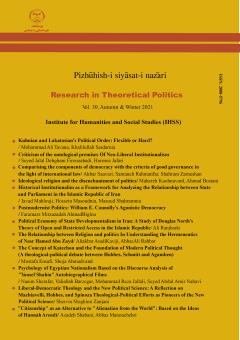-
-
List of Articles
-
Open Access Article
1 - Kuhnian and Lakatosian's Political Order: Flexible or Hard?
mohamad ali tavana خلیل اله سردارنیا -
Open Access Article
2 - Criticism of the ontological premises Of Neo-Liberal Institutionalism
Sayed Jalal Dehghani Firozabadi Hormoz Jafari -
Open Access Article
3 - Comparising the components of democracy with the criteria of good governance in the light of international law
Akbar Savari Samaneh Rahmatifar Shahram zarneshan -
Open Access Article
4 - Ideological religion and the disenchantment of politics
Mahereh Kuohnavard Ahmad bostani -
Open Access Article
5 - Historical Institutionalim as a Framework for Analyzing the Relationship between State and Parliament in the Islamic Republic of Iran
Javad Mahlooji Hossein Masoudnia masoud shahramnia -
Open Access Article
6 - Postmodernist Politics: William E. Connolly’s Agonistic Democracy
Faramarz Mirzazadeh AhmadBiglou -
Open Access Article
7 - Political Economy of State Developmentalism in Iran: A Study of Douglas North's Theory of Open and Restricted Access in the Islamic Republic
Ali Ranjbarki -
Open Access Article
8 - The Relationship between Religion and politics In Understanding the Hermeneutics of Nasr Hamed Abu Zayd
aliakbar asadi kaviji Abbasali Rahbar -
Open Access Article
9 - The Concept of Katechon and the Foundation of Modern Political Thought (A theological-political debate between Hobbes, Schmitt and Agamben)
mostafa ensafi Shoja Ahmadvand -
Open Access Article
10 - Psychology of Egyptian Nationalism Based on the Discourse Analysis of "Yousef Shahin" Autobiographical Films
Naeem Sherafat Valiollah Barzegar Klishomi Mohammad Reza Jalali Seyed Abdul Amir Nabavi -
Open Access Article
11 - Liberal-Democratic Theology and the New Political Science: A Reflection on Machiavelli, Hobbes, and Spinoza Theological-Political Efforts as Pioneers of the New Political Science
Shervin Moghimi Zanjani -
Open Access Article
12 - Citizenship" as an Alternative to "Alienation from the World": Based on the Ideas of Hannah Arendt
Azadeh Shabani Abbas Manouchehri
-
The rights to this website are owned by the Raimag Press Management System.
Copyright © 2017-2026







